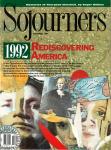The brutal murder of six prominent Jesuit priests and their two co-workers at the University of Central America (UCA) in November 1989 shocked the world. It also gave rise immediately to the question: Who in the Salvadoran high command ordered these military-style killings? This question has yet to be answered.
In a speech on July 1, 1991, at the same university, Rep. Joseph Moakley of Massachusetts, the member of Congress most involved in the case, put it this way: "I am convinced that, at a minimum, the [Salvadoran] high command of the armed forces knew soon after the murders which unit was responsible for the crimes. At a minimum they sought to limit the scope of the investigation in order to protect certain officers from prosecution."
Another question of potentially greater importance for the United States now looms. How much did our military and diplomatic personnel in El Salvador know about plans to kill the Jesuits? This startling inquiry has as its basis testimony given the FBI by U.S. Army Special Forces Maj. Eric Warren Buckland on January 12, 1990. A transcript of Buckland's statement recently came into Sojourners' possession through the Jesuit Social Ministries office in Washington, DC. Jesuits in El Salvador got a copy from the presiding judge in the case, Ricardo Zamora, who had obtained the transcript of the one-hour testimony, but not the unexpurgated video, from the U.S. Embassy there.
Maj. Buckland's statements illustrate the narrowest of military mentalities at work in the highly politicized and complex Salvadoran world of the 1980s. Buckland fancies himself a modern-day Lawrence of Arabia (in his words, "Eric of El Salvador"), using the fatuous nom de guerre "Cheli." Above all, the major's loyalty is to his counterpart in the Salvadoran military establishment, Col. Carlos Aviles, the man who let him in on the plan to invade the university and kill its personnel.
It is Buckland's contention, which he subsequently repudiated, that he knew in advance of a planned military operation against the UCA. This claim and his failure to report it stand as the new question marks in this case. During his testimony Buckland was asked by FBI Special Agent Paul H. Cully, "About how long before the killings did you become privy to any information or meetings?" Buckland's answer: "The end of October."
Later in the same interview Cully asked Buckland what sort of action he understood the Salvadoran military to be planning against the Jesuits. Buckland answered, "To kill him [Father Ignacio Ellacuria]. Yeah, to go in at Ellacuria ... Ellacuria the specific target and UCA the general target ..."
IT SEEMS ENTIRELY plausible, given the camaraderie that this special adviser feels with Aviles, that the Salvadoran colonel leaked to Buckland the plans for sending into the UCA the much-feared Atlacatl Battalion (which was reportedly trained in the United States) for an "op" (military operation).
What is harder to accept is the major's protestations throughout his testimony that he kept the "op" a secret. Robert White, former U.S. Ambassador to El Salvador, told Sojourners that he found it hard to believe that a major in the U.S. armed forces would allow himself to squelch such explosive information. This raised the question, Who in the U.S. military and diplomatic establishment knew of the Salvadoran military's plans to invade the University of Central America? If Buckland knew, whom did he tell, and whom did they tell in turn?
Unfortunately, the murdered Jesuits and their co-workers are not the only Salvadorans whose lives have been placed at risk. This summer, death threats -- presumably from members of the Salvadoran military and their rightist colleagues -- reached a new level against Lutheran Bishop Medardo Gomez, a man often seen as the inheritor of martyred Archbishop Oscar Romero's prophetic mantle. As we prepare to commemorate the deaths of the Jesuits and their co-workers, it is right to wonder if there are plans afoot to kill yet another spiritual leader.
Either there is much more than meets the eye in all of this or much less. President Bush recently sent $21 million in new funds to the military of El Salvador, part of the $42 million that Congress withheld last year due precisely to slow progress in Salvador on the UCA atrocity. The charade will go on, as yet another appropriation for such military assistance is debated in the U.S. House and Senate after the summer recess. A call from Bishop Gomez and Baptist pastor Edgar Palacios has come to people of faith in the United States, asking that we pray, vigil, fast, and act so that this latest package of military assistance to El Salvador not be appropriated by the Congress.
The United States runs the risk of continuing direct assistance to a military establishment that, it appears, killed six Jesuits and their two co-workers with prior U.S. knowledge and consent. How can our national conscience fail to rebel in the face of such perversion?
Joe Nangle, OFM, was executive assistant of Sojourners when this article appeared.

Got something to say about what you're reading? We value your feedback!